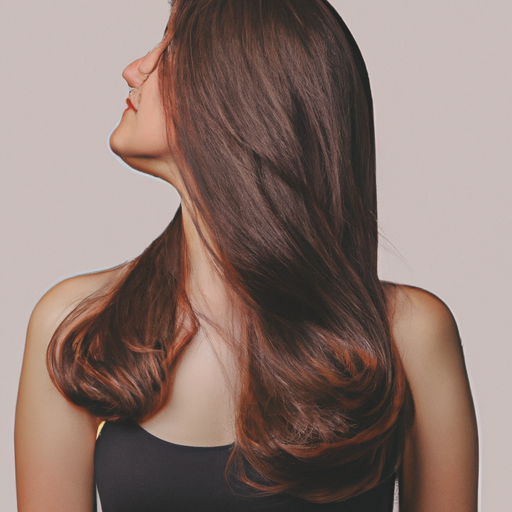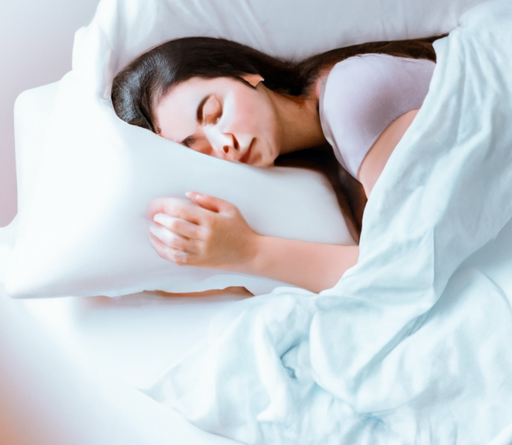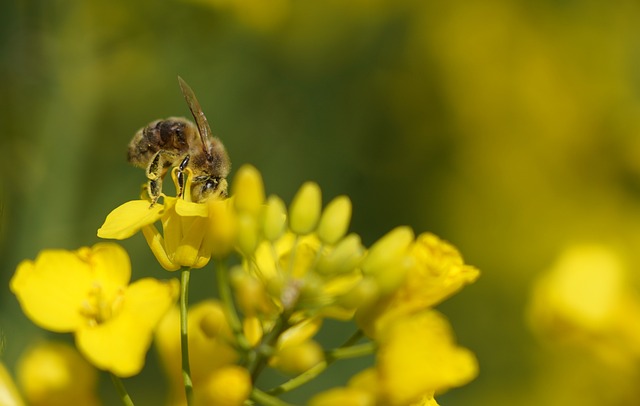
Have you ever wondered how to stop hair loss naturally? Maybe you’ve noticed your hair thinning or falling out more than usual, and you’re looking for a natural solution. Well, you’re in luck because in this article, we’ll be discussing just that – how to naturally prevent hair loss. Whether you’re experiencing hair loss yourself or just want to learn more about the topic, we’ve got you covered.
Hair loss can be a frustrating and unsettling issue, but there are natural ways you can combat it. In this article, we’ll dive into the various reasons why hair loss occurs and explore the different methods you can try to stop it. From incorporating certain vitamins and minerals into your diet to using specific essential oils, we’ll cover a range of natural remedies. So, if you’re interested in discovering how to stop hair loss naturally, keep reading to learn more about these effective techniques.

Table of Contents
How to Stop Hair Loss Naturally
Hair loss can be a distressing experience for many individuals, impacting their self-esteem and overall confidence. While there are various causes of hair loss, adopting natural remedies and making lifestyle changes can help promote hair regrowth and prevent further hair loss. In this article, we will explore different methods to stop hair loss naturally and restore healthy hair.
Causes of Hair Loss
Hair loss can occur due to a variety of reasons, including genetics, hormonal imbalances, nutritional deficiencies, scalp conditions, and certain medical treatments. Understanding the underlying cause of your hair loss is crucial in determining the most effective treatment methods. If you are unsure about the cause of your hair loss, it is advisable to consult a healthcare professional for proper diagnosis and guidance.
Effects of Hair Loss on Self-esteem
Hair loss can have a significant impact on an individual’s self-esteem and overall well-being. It may lead to feelings of embarrassment, self-consciousness, and even depression. Many people resort to hiding their thinning hair or bald patches with hairstyles, wigs, or hats, which can further affect their confidence. By addressing hair loss naturally, you can regain control over your hair and improve your self-esteem.
Different Types of Hair Loss
There are various types of hair loss, each with its own unique characteristics and causes. The most common type is androgenetic alopecia, also known as male or female pattern baldness. This type of hair loss is hereditary and gradual, appearing as a receding hairline or thinning crown. Other types of hair loss include alopecia areata (patchy hair loss), telogen effluvium (excessive shedding), and trichotillomania (hair pulling disorder). Identifying the type of hair loss you are experiencing can help determine the appropriate natural remedies.
Natural Remedies for Hair Loss
Diet and Nutrition
A healthy and balanced diet plays a crucial role in maintaining optimal hair health. Including essential nutrients such as vitamins (particularly B vitamins), minerals, and protein-rich foods can promote hair growth and prevent hair loss. Foods like eggs, fish, nuts, leafy greens, and fruits provide the necessary nutrients for healthy hair. Additionally, staying hydrated by drinking an adequate amount of water each day is essential for maintaining hair health.
Scalp Massages and Stimulation
Regular scalp massages can stimulate blood circulation and promote hair growth. Massaging the scalp with essential oils like lavender, rosemary, or peppermint oil can enhance the effects of the massage. This helps nourish the hair follicles and strengthens the hair roots, reducing hair loss. You can perform a scalp massage by gently applying pressure with your fingertips and moving them in circular motions.
Herbal Supplements
Certain herbal supplements have been found to be beneficial for preventing hair loss and promoting hair regrowth. These include saw palmetto, ginseng, horsetail extract, and green tea extract. These supplements work by inhibiting the production of a hormone called dihydrotestosterone (DHT), which is known to contribute to hair loss. However, it is important to consult a healthcare professional before starting any herbal supplements to ensure safety and efficacy.
Essential Oils
Essential oils have long been used for their therapeutic properties, including hair growth stimulation. Oils like rosemary, lavender, peppermint, and cedarwood have been found to promote hair growth and reduce hair loss. You can mix a few drops of these oils with a carrier oil such as coconut or jojoba oil and massage the mixture onto your scalp. Leave it on for a few hours or overnight for maximum benefits.
Home Remedies for Hair Loss
There are several home remedies that can help prevent hair loss and promote hair growth. These include onion juice, aloe vera gel, fenugreek seeds, and hibiscus flower paste. Applying onion juice to the scalp helps improve blood circulation and stimulate hair follicles. Aloe vera gel has soothing properties and can help maintain a healthy scalp. Fenugreek seeds, when soaked and made into a paste, provide essential nutrients for hair growth. Hibiscus flower paste is known for its ability to strengthen hair follicles and reduce hair fall. Regular application of these home remedies can yield positive results over time.
Hair Care Practices to Prevent Hair Loss
Choosing the Right Shampoo and Conditioner
Using the right shampoo and conditioner is crucial for maintaining a healthy scalp and preventing hair loss. Look for products that are free from harsh chemicals such as sulfates and parabens, as these can strip the hair of its natural oils and contribute to hair damage. Opt for mild, organic, or herbal-based products that nourish and strengthen the hair.
Proper Hair Washing Techniques
Proper hair washing techniques can help prevent hair loss and minimize damage. Avoid washing your hair with hot water as it can strip the hair of its natural oils and make it prone to breakage. Instead, opt for lukewarm or cool water. Gently massage the shampoo into your scalp using your fingertips, avoiding excessive rubbing or pulling. Rinse thoroughly to remove any product buildup.
Avoiding Heat Styling Tools
Heat styling tools such as straighteners, curling irons, and blow dryers can cause significant damage to the hair, leading to hair breakage and loss. Minimize the use of these tools or use them on the lowest heat setting. If possible, allow your hair to air dry naturally and embrace its natural texture. If you must use heat styling tools, apply a heat protectant spray before using them.
Protecting Hair from Sun Exposure
Excessive sun exposure can weaken the hair and make it prone to breakage. Protect your hair by wearing a hat or scarf when exposed to direct sunlight for extended periods. You can also use hair products that contain UV protection to shield your hair from the damaging effects of the sun.
Avoiding Chemical Treatments
Chemical treatments such as perming, relaxing, and coloring can weaken the hair and result in hair loss. Limit the use of these treatments or opt for natural alternatives. If you must use chemical treatments, consider getting them done by a professional to minimize damage.
Lifestyle Changes for Healthy Hair
Managing Stress Levels
Stress is one of the leading causes of hair loss. Adopting stress-management techniques such as meditation, deep breathing exercises, yoga, or engaging in hobbies can help reduce stress levels and promote healthy hair growth.
Regular Exercise and Physical Activity
Regular exercise not only promotes overall well-being but also improves blood circulation, including to the scalp. Engaging in activities such as walking, jogging, or swimming can help nourish the hair follicles and promote hair growth.
Adequate Sleep and Rest
Getting enough sleep and rest is crucial for overall health, including hair health. Lack of sleep can disrupt hormonal balance and lead to increased hair loss. Aim for 7-8 hours of quality sleep each night to promote healthy hair growth.
Quitting Smoking and Reducing Alcohol Consumption
Smoking and excessive alcohol consumption can have detrimental effects on hair health. They can disrupt blood circulation and nutrient absorption, leading to hair loss. Quitting smoking and reducing alcohol consumption can significantly improve hair health and promote hair regrowth.

Managing Underlying Health Conditions
Consulting a Healthcare Professional
If you are experiencing persistent hair loss despite implementing natural remedies, it is important to consult a healthcare professional. They can help identify any underlying health conditions that may be causing hair loss and recommend appropriate treatments.
Addressing Hormonal Imbalances
Hormonal imbalances, such as those caused by conditions like polycystic ovary syndrome (PCOS) or thyroid disorders, can contribute to hair loss. Managing these hormonal imbalances through medications or lifestyle changes can help prevent further hair loss.
Treating Scalp Conditions
Certain scalp conditions, such as dandruff or seborrheic dermatitis, can lead to hair loss if left untreated. Using medicated shampoos or seeking professional help can help manage these scalp conditions and promote hair growth.
Dealing with Nutritional Deficiencies
Nutritional deficiencies, particularly those of iron, zinc, and vitamin D, can contribute to hair loss. If you suspect that you have a nutritional deficiency, it is advisable to consult a healthcare professional who can recommend appropriate supplements or dietary changes to address these deficiencies.
Alternative Therapies for Hair Loss
Acupuncture
Acupuncture, an ancient Chinese therapy involving the insertion of thin needles into specific points on the body, has been found to stimulate hair follicles and promote hair growth. This therapy aims to rebalance the body’s energy flow and address underlying imbalances that may contribute to hair loss.
Aromatherapy
Aromatherapy, the use of essential oils for therapeutic purposes, can also be beneficial for hair loss. Massaging essential oils like lavender, rosemary, or cedarwood onto the scalp can improve blood circulation and promote hair growth. Inhaling the aroma of these essential oils can also help reduce stress levels, which can contribute to hair loss.
Ayurveda
Ayurveda, a traditional Indian system of medicine, offers various herbal remedies and treatments for hair loss. These include herbal hair oils, scalp massages, and dietary changes. Ayurvedic treatments aim to restore balance in the body and promote overall well-being, which can positively impact hair health.
Traditional Chinese Medicine
Traditional Chinese Medicine (TCM) utilizes a holistic approach to address hair loss. TCM practitioners focus on the body’s imbalances and use a combination of herbal remedies, acupuncture, and dietary recommendations to promote hair regrowth. These treatments aim to restore harmony and flow of energy within the body, promoting healthy hair growth.
Hair Transplantation and Restoration
Understanding Hair Transplantation
Hair transplantation is a surgical procedure that involves transplanting hair follicles from one part of the body (usually the back or sides of the scalp) to the balding areas. This procedure is typically performed under local anesthesia and can provide long-lasting results.
Different Techniques of Hair Transplantation
There are different techniques of hair transplantation, including follicular unit transplantation (FUT) and follicular unit extraction (FUE). FUT involves removing a strip of scalp containing hair follicles and dividing it into smaller grafts for transplantation. FUE involves individually extracting hair follicles and implanting them into the balding areas. The choice of technique depends on various factors, including the severity of hair loss and individual preferences.
Considerations for Hair Restoration
If considering hair transplantation or restoration, it is important to consult a qualified and experienced hair transplant specialist. They can assess your hair loss pattern, discuss suitable treatment options, and provide realistic expectations regarding the results. It is essential to educate yourself about the procedure, its risks, and aftercare requirements before making a decision.
Tips for Maintaining Healthy Hair
Regular Trimming and Haircuts
Regular trimming and haircuts help prevent split ends and breakage, promoting healthy hair growth. Aim for a trim every 6-8 weeks to keep your hair looking fresh and prevent any damage from moving up the hair shaft.
Minimizing Hair Manipulation
Excessive brushing, combing, or styling of the hair can lead to hair breakage and loss. Minimize hair manipulation by opting for gentle brushes or combs, avoiding tight hairstyles, and using minimal heat or chemical treatments.
Protecting Hair During Sleep
Friction from pillowcases can cause hair breakage and tangling. Consider using a silk or satin pillowcase, which reduces friction and allows the hair to glide smoothly. Alternatively, you can wrap your hair in a silk scarf or wear a silk bonnet to protect your hair while sleeping.
Using Suitable Hair Accessories
Hair accessories such as elastic bands or clips can cause hair breakage if they are too tight or pull on the hair. Opt for hair-friendly accessories like scrunchies or gentle hair ties that won’t damage the hair shaft.
When to Seek Professional Help
Persistent Hair Loss Despite Home Remedies
If you have been consistently implementing natural remedies and home treatments for hair loss without significant improvement, it is advisable to seek professional help. A healthcare professional can evaluate your condition and recommend appropriate interventions.
Sudden and Severe Hair Loss
If you experience sudden and severe hair loss, it may indicate an underlying health condition or hormonal imbalance. Consult a healthcare professional to determine the cause and appropriate treatment.
Patchy Hair Loss
Patchy hair loss may be a sign of conditions such as alopecia areata or trichotillomania. It is essential to consult a healthcare professional for proper diagnosis and management.
Hair Loss due to Medical Treatments
Certain medical treatments, such as chemotherapy or radiation therapy, may result in temporary or permanent hair loss. If you are undergoing medical treatments that cause hair loss, consult your healthcare provider for support and guidance.
Conclusion
Stopping hair loss naturally requires consistency, patience, and a holistic approach. By adopting a healthy diet, implementing natural remedies, making lifestyle changes, and addressing underlying health conditions, you can promote hair regrowth and maintain healthy hair. Remember to seek professional help if needed and to be patient with the process. With time and dedication, you can achieve healthier, fuller hair and boost your self-confidence.







